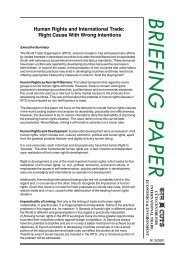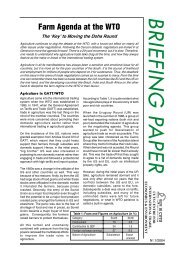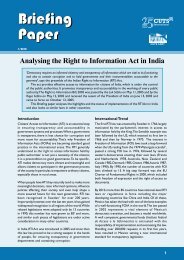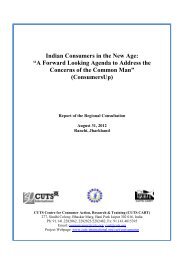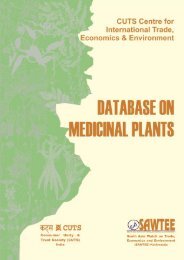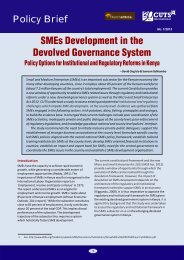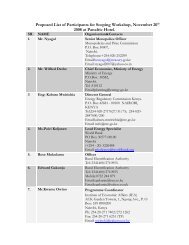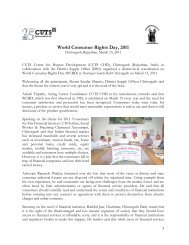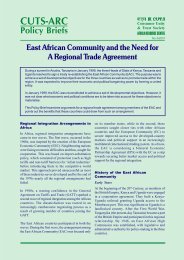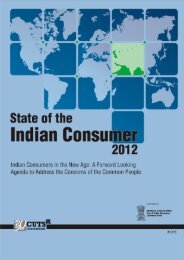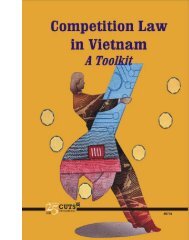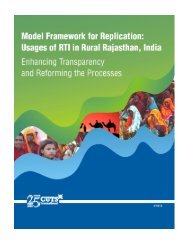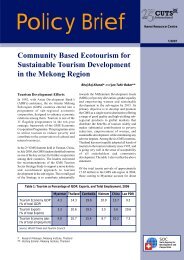Final Report - World Trade Organization
Final Report - World Trade Organization
Final Report - World Trade Organization
You also want an ePaper? Increase the reach of your titles
YUMPU automatically turns print PDFs into web optimized ePapers that Google loves.
In a globalising world it may be a good idea to allow<br />
foreign companies with a clear locus standii to lodge<br />
a complaint. Moreover, in some situations especially<br />
in small economies there may be no domestic players<br />
and only foreign suppliers. For example most of the<br />
goods supplied in Nepal and Bhutan are from India.<br />
Thus, it would be logical to allow Nepalese and<br />
Bhutanese companies and/or consumers to bring<br />
forward complaints before the Indian competition<br />
authority to maintain competition in their markets.<br />
Currently both Nepal and Bhutan do not have a<br />
competiton regime.<br />
Another important aspect of legal provisions that was<br />
highlighted is the issue of sanctions or remedies<br />
suggested in the law. In some countries the levels of<br />
penalty are so low that they cannot act as a deterrent.<br />
For example, in India the competition authority has<br />
power to issue ‘cease and desist’ order only. There<br />
is no risk at all and one can continue rent-seeking<br />
behaviour through anti-competitive practices till the<br />
time it is caught and the CA asks the offending firm<br />
to stop. Similar problems exist in other countries like<br />
Pakistan, Sri Lanka and Kenya where the levels of<br />
fine were fixed long time ago and have not been<br />
revised to take care of inflation, or catch up with the<br />
trends in other countries.<br />
Under the EU and US laws, firms can be fined upto<br />
10% of their annual turnover, when prosecuted for<br />
cartelising. A similar provision has been made in the<br />
new Competition Act, 2002 of India.<br />
6.2 Research & Investigation Capacity<br />
Investigative capacity of the competition authority is<br />
one of the important aspects of competition law<br />
enforcement in a country. However, it seems to be<br />
quite inadequate in most of these countries. It has<br />
both quantitative and qualitative dimensions. The<br />
quantitative inadequacy is quite apparent in most of<br />
these countries. Pakistan has only five professional<br />
staff and India has only 23. While Tanzania has only<br />
one professional staff member, Zambia’s strength of<br />
five maybe quite comfortable considering the small<br />
size of the economy. South Africa and Kenya have<br />
relatively better-sized professional staff. However,<br />
the existence of good strength in professional staff<br />
does not guarantee that the authority has good<br />
investigative capacity.<br />
The professionals in most competition authorities are<br />
not trained well. It is difficult to recruit well-trained<br />
people in these countries and hence the need for<br />
training can hardly be over emphasised. However, it<br />
is sad to note that even the business of recruitment<br />
in the CAs is not taken seriously. The case of a high<br />
ranking investigating officer in the Indian CA is<br />
possibly most illustrative in this regard. The officer<br />
concerned, while talking to one of the researchers<br />
of the 7-Up project, observed, “I was with the<br />
Department of Company Affairs, performing purely<br />
administrative duties, but suddenly I was transferred<br />
here. Neither I had any knowledge of competition<br />
law and experience in investigation, nor I intend to<br />
learn all these.”<br />
It is quite obvious that the issue of building<br />
investigating capability has never been taken seriously<br />
in India. This has led to a situation where the<br />
infamous cement cartel could not be busted despite<br />
repeated complaints and enough prima facie<br />
evidence. The lack of research and investigation<br />
capability became evident also in the ANSAC case.<br />
The case was handled without adequate investigation<br />
and proper argumentation and interpretation of the<br />
legal provisions in the country. The decision of the<br />
MRTPC was mainly based on the decision of the<br />
EU in a similar case involving ANSAC.<br />
The question of extra-territorial jurisdiction that<br />
became important in the case was not given due<br />
consideration by the MRTPC. The Indian law is not<br />
very clear on the issue and hence open to<br />
interpretation. The argument that similar actions are<br />
being taken in other jurisdictions cannot hold much<br />
water. The MRTPC did not do enough homework<br />
and it could not be proved whether the activities that<br />
ANSAC indulged into India, amounted to a restrictive<br />
trade practice (predatory pricing). As a result the<br />
Supreme Court finally went against the order of the<br />
MRTPC in the case causing embarrassment to it.<br />
In Pakistan the Monopoly Control Authority took<br />
initiative to investigate the merger of Glaxo<br />
Laboratories Pakistan Limited and Wellcome<br />
Pakistan Limited. But MCA failed to take any action<br />
and the case was abandoned halfway. The reason<br />
provided by the MCA for this abandonment is that<br />
calculating market shares of individual products with<br />
the identification of their substitutes as required in<br />
the case was a complicated case and the MCA did<br />
not have qualified and trained staff for this exercise.<br />
Similarly, the Kenyan CA found it difficult to identify<br />
the relevant market and dithered into sub-optimal<br />
decisions. For example, SmithKline Beecham Limited<br />
notified the CA about its plan to acquire Sterling<br />
Pulling Up Our Socks w 67



